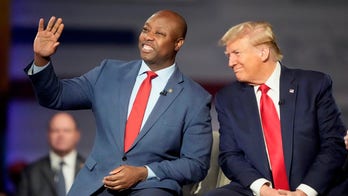Joe and John Try to Do a Deal
“That’s why it’s not a deal until it’s a whole deal.”
-- Vice President Joe Biden talking to reporters at the Capitol after a long negotiation on spending among his fellow Democrats.
House Republicans and Senate Democrats are said to be closing in on a deal to cut less than 2 percent – about $32 billion -- from the projected $1.65 trillion deficit for the current fiscal year.
The deal is being driven by the deepening understanding in both parties that all sides will suffer if the government shuts down on April 8.
With much bigger fiscal issues ahead – the administration’s demand for more borrowing power and the 2012 budget – a scorched-earth battle now looks less appealing to House Speaker John Boehner and the White House.
President Obama is getting rocked in polls for his handling of the deficit issue, so Vice President Joe Biden is now working overtime to line up Democratic support for a plan that would provide about half of the cuts passed by House Republicans six weeks ago.
Such a compromise would likely be enough that, with support from the few fiscal conservatives remaining in the House Democratic caucus, Boehner could push the plan to fund the government for the remaining six months of the federal fiscal year.
At issue now are the sources of the cuts. Republicans were initially concerned that the Democratic proposal will include “accounting gimmicks” that use reductions to future spending instead of current discretionary spending.
But the big fight will be over Republican proposals to use budget cuts to reach policy aims. Republicans want to cut off National Public Radio, end subsidies for Planned Parenthood, the nation’s leading abortion provider, and to strip the Environmental Protection Agency of any funding for regulating emissions the Obama administration says are warming the earth’s atmosphere.
These so-called riders are unlikely to be able to pass the Democratic controlled Senate, but without them, Boehner may not be able to keep together enough of his caucus to pass the legislation.
The new Tea Party, libertarian-minded members of the House will oppose the compromise because it is far short of the 6 percent deficit reduction they sought. And social conservatives who might be willing to compromise on dollars, won’t vote for a spending plan that supports an abortion provider.
It’s also still a wide-open question as to whether Biden can actually deliver the Democratic votes on the plan. He and Majority leader Harry Reid got swatted down on a proposal for a deficit reduction plan that would have trimmed the overrun by a half of a percent as moderate Dems denounced a lack of leadership on spending from Obama.
This time, though, the pushback will come from liberals and pork aficionados who see their prized programs being cut. Plus, many on the left still believe that Republicans will suffer more political damage in a shutdown and are quietly rooting for the GOP to dig in its heels.
Biden and Boehner are ready to make a deal, but many in Congress still believe that a government shutdown, perhaps of limited duration, will still occur after April 9.
Shutdown Stakes Frustrate Fiscal Hawks
“…given their refusal to lead, the President and his party's leaders are committing the nation to the bankruptcy of these programs, the bankruptcy of the federal government, and a debt-fueled economic crisis."
-- House Budget Committee spokesman Connor Sweeney to FOX News previewing a budget proposal that will address the massive shortfalls in entitlement programs.
Many conservatives are getting impatient with the debate over the relatively tiny sums when larger issues lie ahead.
“This is not good ground to make a stand,” one Republican Senator, a famous fiscal hardliner, told Power Play.
On Tuesday, House Budget Committee Chairman Paul Ryan will lay out the proposed House budget for next year that will call for deep cuts in spending and substantial changes to entitlement programs.
And mid-April begins the timeframe during which the Obama administration has warned that the government may run out of borrowing power if Congress doesn’t vote to increase the $14.3 trillion debt ceiling.
Ryan believes his plan has something of a chance since he decided to pull a proposed change to Social Security eligibility and will instead focus on major changes to Medicare and Medicaid.
His plan reportedly would turn Medicaid, which provides fee health coverage for the poor and is facing a massive spending increase under President Obama’s national health care law, into a block grant program for states instead of a program administered in Washington.
On Medicare, the insurance program for senior citizens, Ryan would repace a system in which people pay in all their lives and then get government insurance to a system in which seniors would get vouchers to buy insurance on the open market.
Ryan is hoping to spark interest in Senate Democrats who have shown increasing signs of willingness to take on the nation’s shattered entitlement system, already groaning under the weight of a spate of Baby Boom retirements. By leaving Social Security out for now, Ryan might get some takers and pump up the pressure on President Obama to join the discussion.
Senate Republicans, meanwhile, are looking for ways to use the fights over the debt ceiling and next year’s budget to extract maximum concessions from Democrats. The Senate GOP today will introduce a balanced budget amendment to the Constitution, a plan that already has some Democratic backing.
The worry in the Senate is that the threat of a government shutdown of the 2012 budget or Obama’s demand for more borrowing power will have less leverage if House Republicans have already forced the government to close over a fight about how to fund the government for 25 weeks.
“The public will have very little patience for shutdowns,” said one senior Senate staffer. “You had better make it count.”
House hardliners, though, argue that if they don’t stand on principle now, they will be selling out just like the Republicans from the 1994 wave.
Obama Wades Deeper Into Libya
"It's safe to say what the rebels stand against, but we are a long way from an understanding of what they stand for."
-- House Intelligence Committee Chairman Mike Rogers, R-Mich., in a statement.
White House Press Secretary Jay Carney said flatly on Wednesday that there were no U.S. “boots on the ground” in Libya
Reporters perhaps should have asked about other kinds of footwear, because just hours later the administration was confirming the presence of CIA operatives among the rebel ranks and that President Obama has signed an order authorizing covert operations by U.S. forces in the war-torn country.
The problem is that the rebels aren’t getting the job done. Obama has stipulated that the U.S. is only bombing Libya for humanitarian purposes and that regime change, while supported from the outside, will be an “organic” product of Libya’s uprising.
But there is a lack of broad support for the rebels, who spring from tribes engaged in a generations-long blood feud with Muammar al-Qaddafi’s clan and jihadis looking to depose Qaddafi, who cooperated with the U.S. in the fight against al Qaeda.
The rebels have been driven back from the gains obtained with close air support from U.S. forces. Whether broken after their early successes or simply too disorganized to fight effectively, the rebels have been unable to regain the momentum despite weeks of bombardment by the U.S. and a handful of coalition partners.
Obama is still undecided on whether he will provide direct aid to the rebels, but if he does, the president will likely be acting without the blessing of NATO and the U.N., which both have favored a weapons embargo.
With an increasing U.S. presence on the ground, the next step for trying to prop up the rebels might be to send in “military advisors” to get the tribesmen and jihadis into shape. If the rebels fail and Qaddafi stays in power, it will be an embarrassment for the U.S. and might necessitate a lengthy peacekeeping mission in a region rife with anti-Western terrorism.
But as much as Obama needs to get the rebels back on the good foot, patience is wearing out quickly at home for the war. Not only does the public disapprove, but Congress is making menacing noises about funding for the conflict.
The classified testimony on Wednesday of Secretary of State Hillary Clinton, alternately praised and blamed as the chief architect of the American entry into the way, was by all accounts a bust. Lawmakers have been more sharply critical of the escalating conflict since her visit to the Hill.
Today, Secretary of Defense Robert gates, no happy warrior when it comes to bombarding Libya, will be testifying in public hearings. All ears will be straining to hear if Gates again undercuts the Clinton-Obama pitch as he did when he declared the war not a “vital interest” to the U.S.
RNC Bid to Regulate Debates Bogs Down
“The Committee has determined the best start date might be later than May.”
-- Memo from Republican National Committee Chief of Staff Jeff Larson to prospective Republican 2012 candidates obtained by FOX News.
With the first Republican primary debate just five weeks away, the Republican National Committee is scrambling to put in place a sanctioning committee to regulate the candidate face-offs.
The first-in-the-nation FOX News debate is set for Greenville, S.C. on May 5 and many of the potential 2012 candidates have already agreed to participate. There have been 10 other debates announced, including a handful to be hosted by other news organizations.
The concern among party insiders is that a repeat of 2008’s long debate slog in which candidates had to contend with 20 debates over nine months will not only expose the eventual winner to attacks from long-shot candidates but that voters will lose interest in a repetitive process.
Republicans are looking to mimic what Democrats did in 2008 when the Democratic National Committee established a debate sanctioning committee.
But, by the end of the primary process in 2008, the final combatants, Barack Obama and Hillary Clinton, had still faced off in 25 debates. The party initially sanctioned six early debates for 2007, but the candidates participated in 17 between April and December 2007.
“If this is a long season, there has to be some kind of check on the number of debates,” said one committee member. “I fully support the idea of sanctioning because if you don’t, it can become a runaway train.”
But while committee members like the idea in theory, practical application has been difficult.
The debate regulators selected by Chairman Reince Priebus include committee members and longtime party stalwarts like Maria Cino and former Rep. Dick Armey. There have been multiple efforts to establish ground rules, but so far, no agreement has been reached.
One idea, apparently leaked by a member of the sanctioning group, was to try to get networks to pay for the privilege of hosting debates, a suggestion quickly refused by news organizations. Another idea put forward, according to a committee insider, is to punish state parties that participate in unsanctioned events.
Part of the complication has been that the potential candidates have different interests.
Frontrunner Mitt Romney has little to gain from a huge number of debates, which would give his rivals a chance to pummel him for his support of mandatory health insurance. Romney’s strategy calls for a long slog in which he out spends and out lasts his opponents. Thrice monthly debate poundings would not help his strategy.
Long-shot candidates like Newt Gingrich and Michelle Bachmann, meanwhile, are seeking the maximum possible opportunities to get free publicity and beat up the leaders of the pack.
A member of one prospective campaign – likely to debut as one of those pack leaders –said the sanctioning process had become “a distraction.”
“Yes, limiting the debates to a reasonable number is a good idea,” the campaign adviser told Power Play. “But the process of getting there is getting to be more trouble than it’s worth. If they would have kept it simple, maybe it would have had a chance.”
There is now doubt among the campaigns and among some committee members whether the committee will actually be able to come to any conclusion at all. The same member who spoke of his full support for sanctioning allowed that the process had become “a mess.”
“I think there has been overreach and lots of unrealistic expectations,” the committee member said. “This isn’t a money-making scheme. This isn’t a way to advance your candidate’s interests. This is a plan to put a lid on debates so we don’t have the same 10 people making the same arguments to each other 30 times before December.”
Debate sanctioning board Chairman Jim Bopp, a committeeman from Indiana, Iowa Rep. Steve King and RNC Chief of Staff Jeff Larson have been engaging in direct negotiations with campaigns this week in an effort to find some common ground.
A member of one of the campaign teams said that the proposal “wasn’t ripe.”
“They have all kinds of ideas, but they’re supposed to be presenting us with specific proposals, not spitballing ideas,” the staffer said. “This thing (campaign season) is getting ready to start. This is not the time to be seeking input. Either you’ve got it, or you don’t.”
With increasing concerns that the Republican field is taking too long to coalesce, campaigns are also leery of the proposal by the committee to delay the unofficial kickoff of campaign season.
“It’s time to get going,” the staffer said.
District Work Period
Power Play will be in recess until Monday morning. In its absence on Friday, check out the forthcoming Power Politics column on the 2012 Senate landscape.
And Now, A Word From Charles
“[Sen. Chuck Schumer thinks that a government shutdown] will redound against the Republicans, and I think he's absolutely right. You can see it in the speaker of the House, Boehner. He does not want it. He will do everything he can to avert it. He's speaking with the moderate Democrats hoping they will pass the compromise. The reason, I think, is even if it's pox on both Houses, it's the Republicans who won the last election, who have the mandate and have said we've been empowered by an overwhelming majority of Americans in the vote in November to do something.”
-- Charles Krauthammer on “Special Report with Bret Baier”




